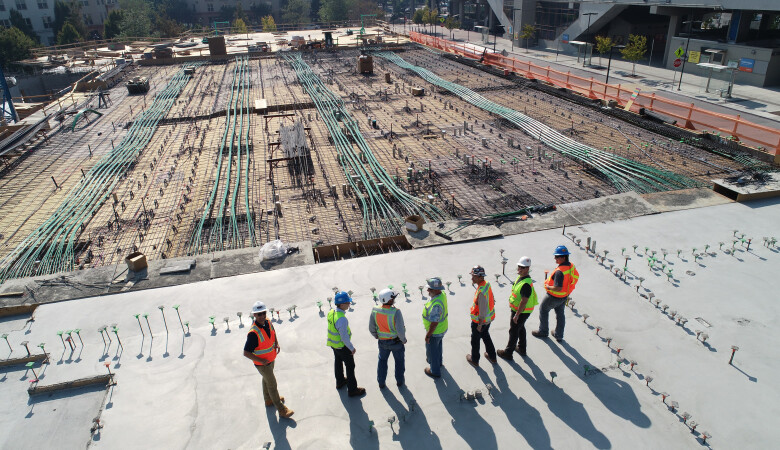God's Eternal Temple (Ephesians Sermon 15 of 54)
October 11, 2015 | Andy Davis
Ephesians 2:18-22
Conversion, Heaven, The Kingdom of Christ
Introduction
Amen. Amen. Well, the world, as I look around, the world is filled with spectacular buildings, and I have an appreciation for the art and science of architecture. I was a mechanical engineer, but I think I esteem architecture more than any of the sciences that were taught at MIT. I’m just kind of an architect, want to be. I know we have some architects in our church and you can come afterwards and say, “Thank you for plugging my profession,” but there's such a combination of science and art in a beautiful building. And I have been in some really beautiful buildings in my time. Recently, I had the opportunity to be in the most spectacular cathedral I'd ever seen in Prague, in the Czech Republic. And my good friend, Preston, is here today. I didn't know you were going to be here, brother, but it was Saint Vitus Cathedral. Have you been in there? Unbelievable, a spectacular cathedral there in Prague, in the Czech Republic. The construction in that building began in the year 1344, went on for centuries. It's over 400 feet long, 200 feet wide, almost 270 feet high. It's a 27-story high building, has amazing flying buttresses, stunning stained glass windows. Some of the stained glass was just spectacular the afternoon that we were there. It was a very hot day. Calvin and I were there, and the light was just streaming in through the stained glass. And there are all these different scenes that you could see as you looked at the stained glass. Biblical scenes, scenes of creation, of the death and resurrection of Christ, the final judgment.
I've also seen some church history as well, especially from that region of the world, Bohemia and different scenes from church history. It's really quite amazing. Many of the people that worship throughout the centuries there were illiterate, and so they just got a lot of education by looking at these stained glass windows, and I can't even imagine all the work and artistry and skill that went into that structure.
Now, from the beginning of time, people, human beings, have thrown themselves into architecture, and they built spectacular buildings, and the work of the architect has been on display throughout the pages of scripture, for good or ill. And we see, for example, the Tower of Babel, which was built with the state-of-the-art technology, and they found ways to build stronger bricks and then higher buildings and they were trying to make a stairway to Heaven, really, and make a name for themselves so they wouldn't be scattered throughout the world, but God interfered with that building project and began the start of nations and language at that point. But it didn't end there. You have, for example, the Great Pyramid of Cheops, which I've never seen with my own eyes, but which is just a marvel of achievement and one of the Seven Wonders of the Ancient World. And I think, as far as I know, the only one that's still standing.
Ancient building projects have been the fruit of human ingenuity and engineering. They're still on display like the Colosseum in Rome, which I've never seen, the Great Wall of China, which I have seen. The Taj Mahal, which I would love to visit at some point, been to India several times but I've never seen it.
Buildings of the Bible
The Jews were especially proud of the temple of Solomon. They were amazed at its beauty and at its skill, and they really put their faith in it and they trusted in it, that it would protect them from all harm. As a matter of fact, as judgment was looming in the days of Jeremiah, Jeremiah had to warn them not to trust in the temple of the Lord. So do not say "The temple of the Lord, the temple of the Lord, the temple of the Lord." In other words, just keep saying that like a mantra, over and over, that God's never going to destroy us, because we have this beautiful temple, but even was going on in the days of Jesus and his disciples. You remember when they went to the temple of Herod, which had been rebuilt and built up over 46 years, and was really pretty spectacular. And as the disciples were leaving, in Mark 13:1, as they were leaving the temple, one of Jesus's disciples said to Him, "Look, teacher, what massive stones, what magnificent buildings," just in awe of the building and the structure.
The Ephesians were that way too, about their own temple, the Temple of Artemis, which was one of the great wonders and also one of the Seven Wonders of the Ancient World. And they were fanatically committed to that temple as a holy place and as a place of lucrative business as well. And we know the story about the riot in Ephesus, in Acts 19 in verse 34, where they all shouted in unison for about two hours, "Great is Artemis of the Ephesians." I think the funniest part about that is most of the people who were there, didn't know why they were there. And so they just joined in. Talk about a mob mentality. "Great is Artemis of the Ephesians." Why are we here? What's going on? And that these things are going on and they're just rioting. And then the city clerk quiets the crowd and says, "Men of Ephesus, doesn't all the world know that the city of Ephesus is the guardian of the Temple of the great Artemis, and of her image, which fell from Heaven?" They were very proud of that temple, of that holy building, that holy structure. Antipater of Sidon, who compiled the list of the Seven Wonders of the Ancient World. That's how we even know what they are, described the temple with these words. "I have set eyes on the wall of lofty Babylon on which is a road for chariots along the top. And I have seen the statue of Zeus by the Alpheus, and the hanging gardens, and the Colossus of the Sun, and the huge labour of the high pyramids. I've seen all of that and the vast Tomb of Mausolus, but when I saw the house of Artemis that mounted to the clouds, those other marvels lost their brilliancy. And I said, apart from Olympus, the sun has never looked on anything so great." That was the Temple of Artemis of the Ephesians.
It was easy for the Ephesians to boast about their impressive temple. But Paul, here in the text you just heard read, sets before the eyes of their heart something far more glorious, a structure far more expansive and dramatic, and radiant with the glory of God, and that is the Church of Jesus Christ. Something that will supplant every building project that ever has been, is now, or ever will be. The greatest building project in the history of the world is the Church of Jesus Christ. And I do not mean the cathedrals. I don't mean this building that we assemble in every week. I don't mean any of the church buildings, the Crystal Cathedral, any of these places that have been built for worship.
But I'm talking about the spiritual temple of God, I'm talking about the Church of the living God, the church of Jesus Christ. It's a spiritual temple, that we are told, and we're going to look at it today, made up of “living stones.” “Living stones,” individual believers from every generation in human history. Now, God had the blueprint for that, the plan of it “before the foundation of the world,” before God even said, "Let there be light," He had the whole structure worked out. God is the architect who made the plans and God is also the builder who was executing the plans. And God is the owner who will get all the glory, and God is the dweller who will live there for all eternity in the center of his people. God the Father gave the command, God the Son paid for it in blood, and God the Spirit is now constructing it. It's going on before our spiritual eyes, even as we speak. Look again at verses 18-22, "For through Him, we both have access to the Father by one Spirit. Consequently, you are no longer foreigners and aliens, but fellow citizens with God's people and members of God's household built on the foundation of the apostles and prophets with Christ Jesus Himself as the chief cornerstone. In Him, the whole building is joined together and rises to become a holy temple in the Lord. And in Him, you too are being built together to become a dwelling in which God lives by His Spirit." Those are the verses we're going to look at today.
Formerly Excluded, Now Having Free Access
“Remember What You Were”
Now, we begin by reminding ourselves that we Gentile believers, the Ephesian Gentile believers, were formerly excluded, but now having free access. This whole section in Ephesians 2 has been a lesson of the journey of salvation for the Ephesians. Where they were when the Gospel first came to them and where they are now and will be for all eternity. They began in verses 1-3 of chapter 2 as living dead. “As for you, you were dead in your transgressions and sins, in which you used to live. When you followed the ways of this world and of the ruler of the kingdom of the air, the spirit who is now at work in those who are disobedient. All of us also lived among them at one time, gratifying the cravings of our sinful nature, following its desires and thoughts. Like the rest, we were, by nature, objects of wrath.”That's where the Gentile believers began, spiritually dead, “enslaved to the world, the flesh, and the devil, could not escape, by nature, objects of wrath.” The wrath of God could have fallen at any moment and God would have been just in condemning them and sending them to Hell.
That's how they began. “But God,” verses 4-6, “but God, because of the great love with which He loved us, God who is rich in mercy, even when we were dead in transgressions and sins, made us alive with Christ. It is by grace you have been saved.” How rich is that? And then verses 8-10, celebrate the richness of God's salvation by grace, “For by grace, you have been saved through faith, and this is not of yourselves, it is the gift of God. Not by works, so that no one can boast, for we are God's workmanship, created in Christ Jesus to do good works, which God prepared in advance that we should walk in them.” Now, when I look at Ephesians 2:10 and then I go to the end of the chapter, and I'm finding about a structure, a spiritual temple that's rising, I bring the two together. We are being crafted by God to be a temple, a spiritual temple, and we are actually workers in that temple to enlist, He has enlisted our aid so that that we can help construct it. We are also workers in this temple. We'll talk more about that at the end of the message. That's Ephesians 2:10.
Gentiles Now Brought Near
Now, Paul wanted to be certain that the Ephesian Christians, these Gentile believers, understood how they had formerly been excluded. Look at verses 11 and 12, “Therefore remember, that formally, you who are Gentiles by birth and called uncircumcised by those who call themselves in circumcision, that done in the body by the hands of men. Remember that at that time, you were separate from Christ, excluded from citizenship in Israel and foreigners to the covenants of the promise, without hope and without God in the world.” That's what you were. All of us were that way. We were excluded. We were outsiders, but now, in verse 13, we have been, “brought near through the blood of Christ.” “We who were once far away, we have been brought near through the blood of Christ.”
And how is that possible? Well, Christ destroyed the barrier, the “dividing wall” that the Law of Moses had set up. God had set up barriers forbidding the Gentiles from inclusion among the people of God. The laws of circumcision, the dietary regulations, the concern for genealogy, all of those things were barriers and dividing walls, the animal sacrificial system, but Jesus came and destroyed it all. Look at verses 14-16. “He himself is our peace, who has made the two, one, and has destroyed the barrier, the dividing wall of hostility, by abolishing in His flesh the Law, with its commandments and regulations. His purpose was to create in Himself one new man out of the two, thus making peace and in this one body, to reconcile both of them to God through the cross by which He put to death or hostility.”
The Gospel of Peace Proclaimed by Christ
That's the language of reconciliation, the language of blood atonement. Jesus Christ has taken our sins on Himself, and He suffered and died on the cross. He shed his blood, and He received in himself the due penalty for our wickedness and our sin. He was our substitute. And if we simply believe in Him, repenting of our sins, and casting all of our hope and our trust on Christ, we are forgiven. We who were once outsiders, we have now been “brought near through the blood of Christ.” And so, verse 17, he says, “He came and preached peace to you who are far away and peace to those who were near.” That's Jesus Christ. So, that's all by way of introduction to bring us up to this point, in verse 18. Jesus Christ has come and preached peace to you through the Gospel.
Isn't that marvelous? Can't you picture in your mind's eye what it says in John 20, on the night of that first day of the week, what we celebrate every year at Easter Sunday, how Jesus came. And though the doors were locked for fear of the Jews, Jesus came and stood in their midst, and said, "Peace be with you." Isn't that magnificent? He came and preached peace to those who are near at that moment, Jews, and said, God's not at war with you anymore. God is at peace with you now. “Having been justified through faith, we have peace with God,” but also, he came by means of the apostles, by means of the missionaries, by means of evangelists. He came out to the town of the Ephesians to Ephesus, and he preached peace to them, too, those who were once far away. And he said, God is saying, in Christ, peace be with you.
Free Access by Christ in the Spirit
If you repent and believe, there's peace with God. And therefore, we have, according to the text, free access to God. Look at verse 18, "For through Him, we both,” Jewish believer, and Gentile believer in Christ, “we both have access to the Father by one Spirit." So he's expanding now, including Jewish believers. They were all one, Jewish believers and Gentile believers. We are all free in our access to God. We can get into the presence of Almighty God, any time. Actually, in the past, everyone was excluded, not just Gentiles, but Jews as well, excluded. Apart from the redeeming work of Christ, we'd have all been outsiders. The real barrier, the real “dividing wall of hostility” was between us and God and it was our sins. The holiness of God, and he could not be in fellowship with sinners like us without it being atoned for.
The message again and again in the Old Covenant, as we've seen was, "This far, you may come in no further." We saw how God spoke to Moses out of the flames of the burning bush, and there was this bush burning and it was not consumed and Moses went over to see this great sight. And as he drew near, he was immediately told, "Do not come any closer." That's the mediator of the Old Covenant. What is he told? “Do you not come any closer. Take off your shoes, for the ground on which you're standing is holy ground, because of my holiness, because of your sinfulness, you cannot come into my presence.” Even the high priest was excluded. Leviticus 16, "You must tell Aaron and his sons that He may not come into my presence anytime he chooses." Just ponder that from Leviticus 16. He may not come in any time he chooses. No one else may ever come in. But even the sons of Aaron may only come in once a year, and never without blood. We're told in the Book of Hebrews. So tell him he may not come. He does not have free access.
Yes, but we do. We have free access. Look at Verse 18 again. “In him, we both have access to the Father by one Spirit.” How sweet is that? We know that Jesus, when He died on the cross, and when He said, "It is finished." The curtain of the temple was torn in two, from top to bottom, and He opened for us, it says, in the Book of Hebrews, “a new and living way into the very presence of God. And he has cleansed our conscience by the blood of Christ,” God has. “And He has washed us with pure water, and we are cleansed, and we are invited, even commanded to come into the very presence of God.” “We have access to the Father by one Spirit.”
So it's the same in the verse I just quoted a moment ago, in Romans 5:1-2. If you'll look at the second verse. Romans 5:1 says, "Therefore since we have been justified through faith, we have the peace with God through our Lord Jesus Christ, and access by faith into this grace in which we now stand." All of us, I say, all of us underestimate the privilege of that access. Every single one of us underestimates, and under-uses the access. We don't pray enough. We don't come into the presence of God enough. We are characterized, tragically, by prayerlessness. And this text is in a very sweet way, Ephesians 2:18, beckoning to you to come into the presence of God more than you do, to come in again and again, to “pray without ceasing,” to live your lives in fellowship with God. Having free access into the presence of God. As it says in Hebrews 4:16, “let us then approach the throne of grace with confidence, that we may receive mercy and find grace to help us in our time of need.” So we can approach the throne of Almighty God any time, bringing any burden, great or small, right into the presence of our heavenly Father. By the power of the Spirit, we have access. We all do.
Spiritual Access, Not Physical Access
This access is spiritual, it's not physical. This is the very thing that the Lord was preparing the human race for. In His amazing conversation with the Samaritan woman at the well, you remember that? Remember that conversation He had with her, and He's talking about springs of living water flowing out from within us, from which we can drink any time? We're going to talk about that more at the end of Ephesians 3, I can't wait. It's such a sweet meditation on how the Lord yearns to have intimate fellowship with us all the time by the power of the Spirit. Jesus brings up, as you remember, her sin. "Go call your husband and come back." You remember? "I have no husband." And Jesus said, "You're right in saying you have no husband, the fact is, you've had five husbands and the man you're now living with is not your husband. What you've said is quite true." A very interesting way of dealing with her statement. She said, "I perceive sir, that you are a prophet. Now our Father said that we ought to worship on this mountain and you Jews claim we should worship on that mountain." So That was very deft of her I think clever. “Alright, let's change the subject and quickly.” She brings up the issue of a place of worship and this is very relevant to the text we're looking at today, And Jesus began to reveal the fullness of the Father's plan to this woman, this Samaritan woman, and He spoke these words, “believe me, woman, a time is coming when neither on this mountain nor in Jerusalem, will you worship the Father. God is spirit, and those who worship Him must worship in Spirit in truth.”
What is He saying? He's saying there's going to come a time very soon when the Old Covenant will be abolished, destroyed, made obsolete and you will not need to go to one particular geographical location anymore to worship God, you'll be able to worship God by the spirit anywhere in the world. Very thing that the Jews were forbidden to do. “You may not worship God under every spreading tree and on every high mountain, you can't do that, you have to go to the one place I chose.” And they had these pilgrimages to the one place that God chose, Jerusalem. But we are free to worship anywhere. Now, I'm not against buildings, I'm not against the structure, I'm very grateful for them during a downpour, aren't you? I praise God for the air conditioning, which works so well to keep us generally Cool. I find that I preach better to colder people. So the hotter it is the sleepier you all get and me too.
So the structure is needed because we have bodies and I think this is a beautiful building and I'm not against the buildings that people erect to worship God, I'm not against it, I'm just saying He's not confined to that space. And believe me, I'm not saying you don't need to come to church on Sunday, you wouldn't believe how many people kind of quote Jesus, in John 4 and say, “I can worship anywhere, I don't have to be in church on Sunday. “We'll get to that toward the end. That's not what I'm saying, but what I am saying is, there isn't just one locus, one place of worship anymore, it's gone. Now, we can worship God anywhere. Just as Stephen saw or foresaw, so plainly, in Acts 7:48, “the Most High does not live in houses made by men,” and so we are able to worship God anywhere in this spiritual temple.
God’s Nation, Family, and Temple
Now, in Verse 19, he broadens out, to give us a sense of the greatness of the church. The greatness of what has happened to these Ephesian Christians, these Gentiles, what they are now, a part of, they underestimate the church and he wants to help them to see the greatness of the church. Look at verse 19, “Consequently, you Gentiles are no longer foreigners and aliens, but fellow citizens with God's people and members of God's household.” Now, in the New Testament, there are lots of images for the Church but here we have three right in this passage that we're looking at. The Church is a nation of which we are citizens, the church is a family of which we are adopted members, and the church is a building of which we are “living stones.” Now later in Ephesians 4, we'll add a fourth beautiful image, the Church is the body of which we are living members. That just shows the amazing complexity of the Church. We need all of these metaphors. Can I just say to you as an aside the Church is the grandest, glorious work that God has done in history. This is the work of God. This is the greatest display of the glory of God is the Church of Jesus Christ. That's what he's doing. So look at each of these images.
Nation: No Longer Outsiders, Now Citizens
First, nation. We are no longer outsiders now we are citizens, all Christians everywhere are welcome, right into the presence of God. Our status has changed forever, we're no longer aliens, we're no longer outsiders, we are now citizens of the Kingdom of Heaven. Our citizenship is in Heaven, it says in Philippians 3, we are citizens. Christ is the King and we are His subjects, and Gentile Christians are every bit as much citizens as Jewish Christians. Equal Access, equal privileges.
Family: Adopted Members of God’s Household
Secondly, family. We are all, every one of us, adopted members of God's household. Now, the Greek word household here is a rich and full word, the Ephesians would have understood it well, would have to do with a wealthy man and his family, and his estate. And so that's the issue of this household, a grand estate, a large and wealthy family, and Paul asserts that we are beloved, adopted members of this family of God. Back in Ephesians 1:4-6, we have these words “in love,” speaking of God the Father, “in love, He predestined us to be adopted as His sons through Jesus Christ, in accordance with his pleasure and will, to the praise of His glorious grace.” It says in John 1:12-13, “As many as received Him, as many as believed in His name, He gave the right to become children of God.” And then in Romans 8:15-17, “For you did not receive the Spirit that makes you a slave again to fear, but you received the Spirit of son-ship or of adoption by which we cry ‘Abba Father.’ The Spirit Himself testifies with our spirit, that we are the children of God. Now, if we are children, then we are heirs, heirs with Christ, co-heirs with Christ” and that's what we are.
Building: A Temple Rising
And the third image here is of a building that's rising and becoming more and more built up more and more glorious, a more and more elaborate structure all the time. This building, it says in verse 20 is “built on the foundation of the apostles and prophets with Christ Jesus Himself as the chief cornerstone.” Now, this building has a long history, if you look back at the history of the Temple, and before that to the history of the tabernacle, the tabernacle was the start of this idea, of a place where God would dwell in the midst of His people and how God showed to Moses a vision of how it was to be built, and how he built this tent, this holy tent, this tabernacle, by the instructions and the vision that God had given Moses on the mountain. And so, he built it and when he built it, God came and filled it with His presence, with the glory cloud. And no one could enter the tabernacle because of the glory of God which filled the place.
And then how, centuries later, David once he was established as king in Jerusalem and all of his enemies had been defeated, and he's there, he says, "Here I am living in a palace of cedar, while God is still in a tent. I want to build a permanent dwelling place where God can dwell in the midst of His people." It was a good idea. David was showing initiative toward God, "Hey, God maybe you hadn't thought about this before. I'd like to think of this thing. This is something I want to do for you." I love it. And isn't it how sweet how God speaks to David, through Nathan the Prophet, kind of putting him in his place, but at the same time, greatly exalting him too. He says, "Are you the one to build a house for me? I'm going to build a house for you. And after you're gone, after you die, I'm going to raise up one of your sons and he will build a house for my name and his kingdom will endure forever and ever." Now, you know, he's not talking about Solomon, but he kind of is. It's like yes and no. He is talking about Solomon because when he sins, I will beat him, but I'll never take my love from him and you read about it, but he says that then there's this greater son whose kingdom will never end, and that's Jesus, and “He will build a dwelling where I will live in the midst of my people, forever.” And that's fulfilled in the Church of Jesus Christ that's the very thing that Paul is talking about.
Now, when Solomon built the temple, the same thing happened again in the 2 Chronicle 7 the glory of the Lord entered the place. And it filled the place and God's glory radiated there, and there was a symbol of God's desire to dwell in the midst of his people and fellowship with His people, but you know that the Jews, in subsequent generations and centuries, sinned and sinned and sinned some more and God sent them warnings but they wouldn't listen. And so at the right time, under the judgment of God, and the justice of God, it was time for the glory cloud to leave the temple of Solomon and to leave the people and then judgment to come. And it came and the Babylonians came and they acted it says in Psalm 74, “like men wielding axes and they chopped up all the carved wood and they burned it and they destroyed the temple, the place where God had met with His people.” So, still this yearning for a place where God could dwell in the midst of his people unfulfilled, but there is the son of David who's coming and he would build it, and Jesus is that one, and he has come to build this true, true dwelling place, and so Jesus came and died on the cross and He was buried on the third day, He was raised from the dead and He showed Himself to His disciples and appeared to them over a period of 40 days, and then He went up and ascended and He went through the heavenly realms and He went through, it says in the Book of Hebrews, “the greater and more perfect tabernacle that's not man-made, not built by human hands” and that's the true heavenly dwelling place where God will dwell with His people forever. And that's the work of Christ.
Church: God’s Dwelling Place
Now, the Church is the dwelling place of God. Look at Verses 21 and 22, “in Him,” Christ, “the whole building is joined together and rises to become a holy temple in the Lord and in Him, you too are being built together to become a dwelling in which God lives by His Spirit.” That is what is going on around the world, does not matter what the lead story is, CNN, or BBC News, or any of the news outlets you follow. The number one story, every day, is the building of His Church. That is the story of human history. That's what's going on in the world, nothing else matters. This is the only eternal building that's getting built. This is it.
Peter gives us some other images here that help us to understand this a little bit better. In 1 Peter chapter 2:4-5, Peter says this, “as you come to Him, the living stone rejected by men but chosen by God and precious to Him. You also, like living stones, are being built into a spiritual house, to be a holy priesthood offering spiritual sacrifices as acceptable to God through Jesus Christ.” So as each individual person in “every tribe and language and people and nation,” all around the world, comes to genuine faith in Christ, they become alive. They were dead now, they're alive. They are “living stones.” Kind of a paradoxical image, but we are then settled into a place in the wall of this spiritual temple that God had been reserving for us in particular, from “before the foundation of the world.” It's like a jigsaw, puzzle and only you can go there, you're the only one who can fit in there, and let me tell you something when it's all done, there'll be no gaps in the walls, amen. Every elect person will be saved, every jigsaw puzzle piece will be put in, and they'll all be there, how glorious is that? And we are living stones and we're set into the walls to be this holy temple rising, filled with the Holy Spirit, filled with the presence of God. That's what we are.
Peter has to go ahead and complexify the image because we're also a “holy priesthood offering sacrifices inside the structure.” That's true, another sermon, another day, but we are “living stones” and we have been quarried from Satan's dark kingdom by some special ops people, who have gone up over the walls of Satan's dark kingdom, they've scaled the walls. I picture like ninjas, or some kind of SEALS, Navy SEALS or something like that, and they're going up over the walls, and they're in enemy territory, and they're finding these dead stones, and by the Gospel they're bringing them to life and they're getting them out of there and they're “transferred from the kingdom of darkness into the kingdom of the beloved Son,” and we’re settled into a wall and will be there forever. That's evangelism and missions. That's what's going on, and it's thrilling. It's thrilling. And I have no idea where I am in my notes. Alright, I'm sorry.
The Apostles and Prophets the Foundation: Christ the Cornerstone
An Amazing Image
Ah, yes. The “apostles and prophets are the foundation of this building.” What does that mean? Members of God's household verse 20, “built on the foundation of the apostles and prophets with Christ Jesus Himself as the chief cornerstone.” This is an amazing image. Every grand and glorious and lofty structure has to have a solid foundation, an immovable foundation. “It can't be on sand,” Jesus taught us in the Sermon on the Mount, where it shifting and the structure is going to fall. We need something that will never move. And Paul says, "It's the apostle and prophets with Christ He as Himself as a chief cornerstone.” It's a challenging statement here especially since Paul himself says in 1 Corinthians 3:11, “no one can lay any foundation other than the one already laid, which is Christ Jesus.” It's like, what a minute, so is it Christ Jesus, or is it “the apostles and prophets with Christ Jesus as the chief cornerstone.” Friends, it's not either/or. It's both/and. Christ Jesus is the foundation of this structure, it's true. But how do we have access to Christ Jesus, except by the words of scripture? By the words of the holy apostles and prophets, by this book, we come to know Christ. By the words of the apostles and prophets, the apostles and prophets mediate God's word to a dying world in the form of this book. That's how we know you. You don't know anything about Jesus, apart from this book.
And so, as the apostles were “eyewitnesses of His glory” as Peter says. as 1 John 1:1 says, “that which we have seen with our eyes, what we have handled, what we have interacted with concerning the Word of Truth, this we proclaim to you.” They were eyewitnesses, the apostles, and prophets. Peter was the rock on which Jesus would build his Church, not just his confession, but him as eyewitness and the other apostles having been with Jesus for three years and being able to testify to the world, “We have seen, and we testify that He is the Son of God!” And so, the apostles and prophets represent to me in this verse, scripture as it testifies to Jesus, the chief cornerstone.
Christ as Cornerstone
Now, what does it mean that Jesus is the chief cornerstone? Well, architects tell us that's the first stone you set and everything else gets its reference from that everything else goes in reference to Jesus, the chief cornerstone. It has to be perfectly proportional, it has to be 90 degrees if you want the walls 90 degrees, it has to be solid and everything else is based on Christ. So it's the same thing he teaches, in 1 Corinthians 3:11, “no one can lay a foundation other than one almighty God already laid a chosen and tested cornerstone.” Isaiah 28, that's Jesus.
Fitly Framed Together
And so, the “apostles and prophets” is the scripture's testimony to Jesus. When Jesus rose from the dead, comes to the upper room, appears to the disciples and He says, in Luke 24, "This is what I told you when I was with you. Everything must be fulfilled. That is written about me in the Law of Moses, the prophets and the Psalms, then He opened their minds so they could understand the Scriptures. So, as evangelists and missionaries, go out, they testify based on the words of the apostles in the history of Jesus and the prophets of the Old Testament as they got ready for Jesus, and even the prophets of the New Testament. We'll talk about that when we get to chapter 3, as Paul says, "Now revealed to the apostles and prophets", and we'll get to that, but this is all the immediate Word of God revealed to the human race and we all, verse 21, are built together. “In him, the whole building is joined together and rises to become a holy temple in the Lord.” I love the KJV in verse 21, "In whom", listen to this, "all the building fitly framed together", isn't that awesome? “Fitly framed together, groweth unto an Holy Temple in the Lord.” “Fitly framed together,” we are perfectly fit together in this holy structure Jews, Gentiles, believers in Christ alike all of us joined together. Now, in Ephesians 4:16, we'll get the same image with the body side. Ephesians 4:16, “from Him, the whole body joined and held together by every supporting ligament grows and builds itself up as each part does its work.” So, we're fit well together.
God’s Final Dwelling Place
I was reading some time ago about the Taj Mahal, and in one of the walls, this is a magnificent structure, and in one of the walls, there is a flower, an inlaid flower, one inch square, made of precious stones, polished, set in the wall, think about it. One inch square with 60 different stones, 60 different hues and colors, etcetera, but yet set in there so perfectly that you can't feel anything. It feels like glass. I'm thinking, how long did they work on that flower? But that's the image I have. We are perfectly fit together in the wall, in perfect unity with each other, at least we will be in the end when God's done saving us. That's the picture we have here. This is God's final dwelling place. “In Him the whole building is joined together and rises to become a holy temple in the Lord and in Him, you too are being built together to become a dwelling in which God lives by His Spirit.”
The Spirit Indwells Us While We Wait
Now, there is an already and a not yet sense of this. We are already this, it's already happening, we are already one in Christ, we are already united through the Spirit, we can already assemble together with brothers and sisters all over the world, and we can worship God by the Spirit. It's already going on at the present tense. You are a building, indwelt by the Holy Spirit of God, but you must know there's better and more yet to come. There's a not-yet aspect to this. And so, the Book of Revelation completes our study for the day before I get to applications and that is the picture of the New Jerusalem. "Then I saw a New Heaven and a New Earth, for the first Heaven and the first Earth had passed away, and there was no longer any seen. Then I saw the holy city, the New Jerusalem coming down out of heaven from God, prepared as a bride beautifully dressed for her husband." That is this structure, that's Zion, this is the heavenly Zion, that's the very thing that he's talking about here. It's not different, it's the same, the New Jerusalem is the church of Jesus Christ. "And I heard a loud voice from the throne saying," Now, here's the key, " ‘Now, the dwelling of God is with men and He will live with them, and they will be His people, and God Himself will be with them and be their God.’" That's what God has wanted all along. “I want a place where I can dwell together with my people.” That's it, that's the not-yet part. God will dwell in our midst, and we will see His face and the whole city will it be irradiated with the glory of God in Christ, and there'll be no temple in that city we're told, because “God and the Lamb and the church are the temple. All one together.” Alright, so that's the complex image we have here by way of application.
Application
Are You on the Outside Looking In?
First, let me just plead with you if you know yourself to be an outsider of all of this. I plead with you, don't stay an outsider, you've heard the Gospel today of Christ crucified, resurrected, how all you need to do is repent and believe and you will immediately become a living stone having been rescued from Satan's dark kingdom, you will be set in a place that has been reserved for you “from before the foundation of the world,” for you. Just come to Christ. Don't leave here an unbeliever I plead with you, be reconciled to God.
Christians: Recognize the Majestic Picture of the Church
Christians, do you recognize the majesty of this work? Do you see the glory of it? Do you see how this makes life worth living? It really does. This work is worth doing, and this is glorious. Think about the Church. Think about these images. You're citizens of a holy nation, you are adopted sons and daughters of the family of God, and you are living stones in this amazing structure that's rising and becoming bigger and more glorious all the time. That's amazing, praise God for that. And so, if I could just say esteem the Church, think highly of the Church. This isn't like a club we come to on Sundays. Well, you know, I go occasionally, I come. “I'm in this and I'm in that and I go to church from time to time on Sunday morning.” This is the work God is doing in the world. So esteem the Church, be in the Church. “Do not forsake the assembling of ourselves together, ”as it says in Hebrews 10:24, “some are in the habit of doing. But Let's gather together and encourage one another and all the more as you see the day approaching.” Be a covenant member of this Church. If you're just a visitor, be a covenant member of a church where you live, be committed to the Church
Access to God
Also concerning access. I spoke of it in the middle of the sermon, I want to say it again. You have access to God now that you're part of this holy temple. Take advantage of it, and what's burdening you. What did you carry in here today? What are you struggling with? What are you worried about? Is it money? Is it a relational problem? Is a marital issue? Are you're struggling with sin, is there some sin issue, your guilty conscience, is that bothering you? You have access to the “Father by the Spirit.” Take advantage of it now. Cast your burdens on him in prayer. And don't just go in there and reference to your burdens pray for your brother and sisters. Find someone after, we're about done, we really are. Find someone and say, "How can I pray for you today?", and pray for him. “You have access to the Father by one Spirit.”
An Exhortation for Church Involvement
And let's get involved in this building project, what do you say? I'm not saying be involved in what used to be known as the Building and Grounds Committee, or find out what deacons are doing yard work in the church. I think the church looks great. I'm not saying there's not work to be done. Please don't, whoever's in charge of that be angry. That was a great recruiting time and you didn't take advantage. I'm trying to give you recruiting to a higher level. Get involved in the building of the Church of Jesus Christ use your spiritual gifts, Have a ministry, throw yourself into this building project be involved in evangelism and discipleship. Get your five lost people's names and pray for them and open the door to evangelism and witness.
And finally, can I just say, look forward to Heaven. Look forward to what it's going to be like to be in the New Jerusalem surrounded by the people of God, indwelt by God through His Spirit. Close with me in prayer.
Prayer
Father, what a glorious passage is this. Ephesians is glorious, thank you so much for the things we're learning in this book, and I pray that we would not only just be members of this grand and glorious eternal building project, but that we would be laborers as well. We living stones in the wall, but also those special ops forces that scale the walls of the kingdom of darkness and rescue lost people. Help us to do all of that. We pray that in Jesus name, Amen.






























